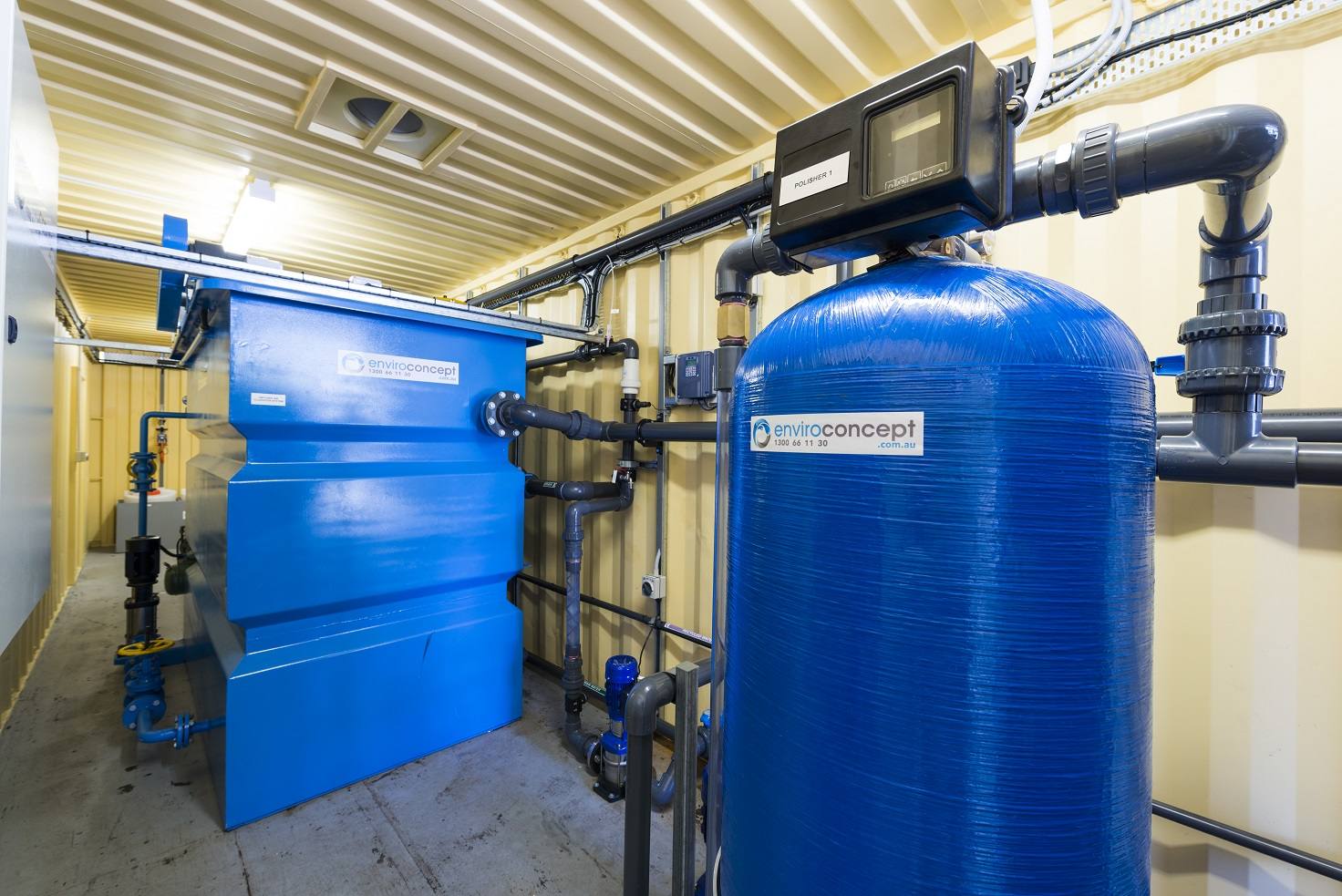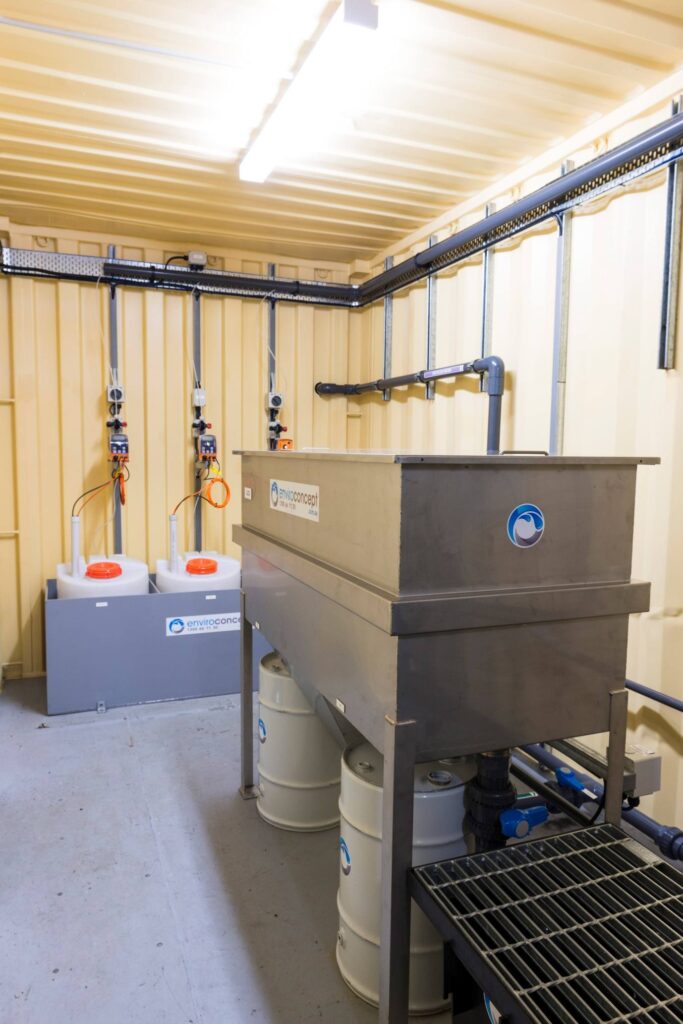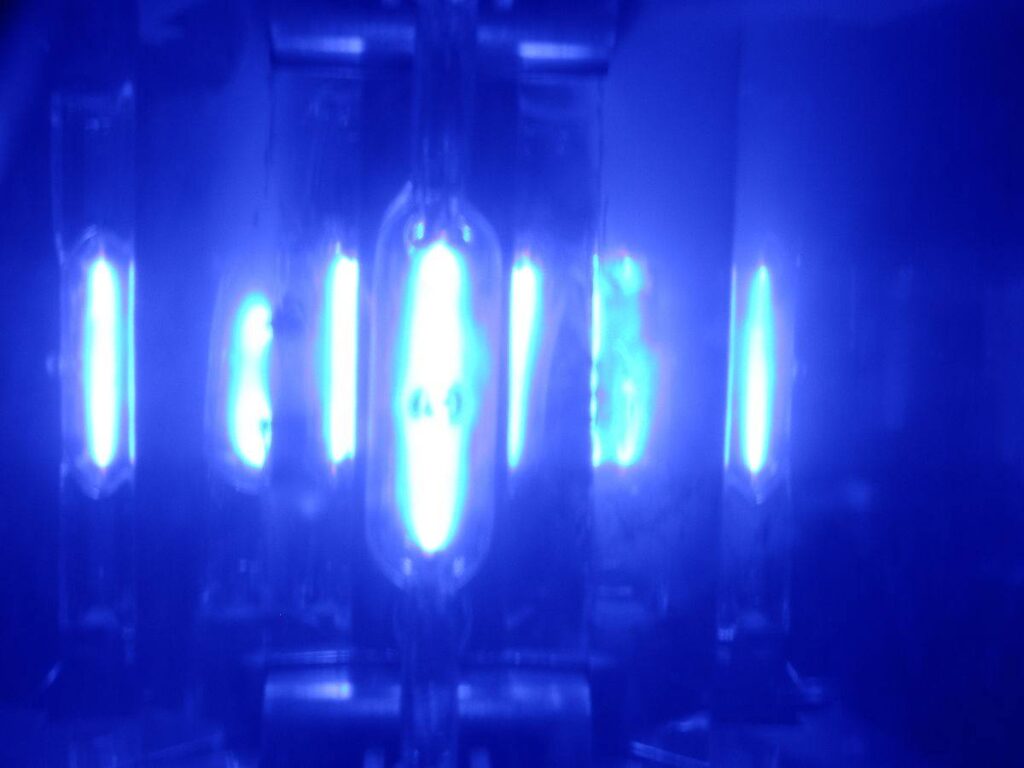
Wash bay recycling systems are essential for businesses seeking efficient and compliant solutions for their vehicle and equipment wash needs. Are generic wash solutions slowing you down? At Enviroconcepts, we understand the frustrations of operations managers in industries like mining, construction, equipment hire, transport, and automotive who require custom-engineered portable wash bays and water treatment systems tailored to their operations.
Understanding Wash Bay Recycling Systems
Wash bay recycling systems are comprehensive solutions designed to collect, treat, and recycle wash water generated from cleaning vehicles and heavy equipment. These systems are critical for industries that produce significant amounts of wash water, ensuring that operations are both cost-effective and environmentally responsible.
Wash bays serve as designated areas where vehicles and equipment are washed. The wash water used in these processes often contains contaminants such as grease, detergent, and suspended solids. Without proper treatment and equipment like oil-water separators, discharging this wash water can lead to environmental pollution and legal penalties.
How Wash Bay Recycling Systems Work: An In-Depth Look
A wash bay recycling system involves several key components working in harmony to treat and recycle wash water:
- Collection: The process begins with the collection of wash water from the wash bays. Both roofed and unroofed wash bay systems are designed to capture all runoff, preventing contaminants from entering the stormwater system.
- Pre-treatment: Initial screening removes large debris and suspended solids from the wash water. This step is crucial to prevent clogging in subsequent treatment stages.
- Oil-Water Separation: An oily water separator or OWS is employed to remove hydrocarbons, oils, and greases. The oil-water separator ensures that the majority of free-floating oil is eliminated, reducing the load on downstream treatment processes.
- Advanced Filtration: After going through the oil water separator, the water then passes through advanced filtration systems, which may include sand filters, multimedia filters, coalescing filters, or membrane technologies, to remove finer particles and emulsified oil.
- Water Treatment Solutions: Additional treatment, such as pH adjustment and disinfection, may be necessary to meet specific regulatory requirements. This step ensures that the recycled wash water is safe for reuse and complies with trade waste discharge standards.
- Reclamation and Reuse: The treated wash water or wastewater is stored in tanks and is ready for reuse in the wash bay, reducing the need for fresh water and promoting sustainable water management practices.
Top Benefits of Implementing a Wash Bay Recycling System
Implementing a wash bay recycling system offers numerous advantages for various industries that extend beyond the separation of oil from water and simple water conservation:
- Cost Savings: By reclaiming wash water and wastewater, businesses can reduce water consumption by up to 80%, significantly lowering water bills. Additionally, reducing trade waste disposal costs can lead to further financial benefits.
- Environmental Compliance: Using an effective treatment system in wash bays ensures that discharge meets local authority regulations regarding trade waste. This compliance helps avoid fines and legal issues related to environmental breaches.
- Operational Efficiency: Efficient water reclamation systems minimise downtime by providing a constant supply of wash water. This efficiency is especially important for industries with high wash frequency, such as car washes and construction or mining equipment maintenance.
- Sustainability: Demonstrating a commitment to sustainable practices enhances corporate reputation. Recycling water reduces the environmental footprint, aligning with global efforts to conserve water resources.
Comparing Different Types of Wash Bay Recycling Technologies
Choosing the right wash bay recycling technology depends on specific operational needs:
- Portable Wash Bays: Portable wash bays are ideal for temporary sites or operations requiring mobility. Portable wash bays are modular and can be easily relocated, making them suitable for equipment hire companies, construction projects, or remote mining sites.
- Oil Water Separators: An oily water separator or OWS is an essential component for removing hydrocarbons from wash water. Technologies like coalescing plate separators or vertical gravity separators are commonly used.
- Advanced Filtration Systems: Membrane filtration, ultrafiltration, or reverse osmosis can be employed for higher levels of water purity, especially when the recycled water is used in sensitive applications.
- Chemical Treatment Systems: Incorporating chemical dosing systems for pH adjustment or flocculation can enhance the removal of dissolved contaminants, and suspended solids.
Enhanced Oily Water Separator (OWS) Efficiency: The Role of Coalescing Media in Oily Water Separators for Wastewater Treatment
Oily Water Separators (OWS) play a pivotal role in the case of treating wastewater by effectively removing grease and suspended solids. Central to the efficiency of the separator is the integration of coalescing media, a breakthrough in oil water separator technology that enhances oil separation while managing solids more effectively. This section delves into how Oily Water Separators (OWS) with advanced coalescing media deliver unmatched results across industries requiring robust wastewater management.
What Makes Coalescing Media Key to Oily Water Separator (OWS) Performance?
- Optimised Oil Removal: Coalescing media in oil water separators (OWS) enhances the separation process by increasing surface area, allowing smaller droplets to merge into larger ones. This facilitates quicker and more effective removal.
- Efficient Solids Management: The structured design of the coalescing media prevents the accumulation of suspended solids, ensuring uninterrupted separator operation and reduced maintenance needs.
- Versatility Across Any Case: From heavy industrial applications like construction to vehicle wash bays, oil water separators (OWS) equipped with coalescing media handle a variety of wastewater compositions, delivering reliable performance in challenging scenarios.
Applications of Oily Water Separator (OWS) with Coalescing Media

- Mining Operations: Effective removal of hydrocarbons from high-solid-content wastewater.
- Transport Depots: Ensures compliance with environmental regulations by treating wastewater.
- Wash Bays: Critical for managing wastewater containing grease and solids from vehicle and equipment cleaning.
Key Benefits of Advanced OWS Systems
- Regulatory Compliance: By leveraging coalescing technology, oil water separators ensure that treated wastewater from wash bays meets strict environmental discharge standards.
- Cost Efficiency: Reducing the frequency of maintenance and the need for chemical treatments lowers operational costs.
- Sustainability: Enhanced separation minimises waste, promoting the reuse of treated water and reducing environmental impact.
Case Studies Highlighting Success
Industries implementing coalescing media in an oil water separator (OWS) in their portable wash bays report significant reductions in wastewater contamination, improved system uptime, and compliance with stringent local and federal discharge standards. These separators have proven indispensable in every case requiring a combination of high efficiency and minimal environmental footprint.
Cost Savings and Environmental Impact
Investing in a wash bay recycling system provides tangible cost savings:
- Reduced Water Consumption: Reclaiming wash water decreases the demand for fresh water, which can be a significant expense, particularly in areas with water scarcity or high utility costs.
- Lower Waste Disposal Costs: Treating wash water or wastewater on-site reduces the volume and toxicity of trade waste discharged, leading to lower disposal fees charged by local authorities.
- Avoidance of Penalties: Compliance with environmental regulations prevents costly fines that can result from the unauthorised discharge of contaminated wash water.
From an environmental perspective:
- Conservation of Water Resources: Reducing fresh water usage supports sustainability efforts and lessens the strain on local water supplies.
- Protection of Ecosystems: Proper treatment of wash water prevents harmful contaminants from entering waterways, protecting aquatic life and ecosystems.
- Reduced Carbon Footprint: Efficient recycling systems for wash bays require less energy and contribute to lower greenhouse gas emissions associated with water treatment and transportation.
Installation Guide: Setting Up Your Wash Bay Recycling System
Setting up a reclamation system for wash bays involves careful planning and execution:
- Assessment: Conduct a thorough analysis of your case and wash requirements, including the types of vehicles or equipment, wash frequency, and the nature of contaminants present in the wash water.
- Design: Contact and collaborate with experts to develop a customised portable wash bay design. Consider factors such as space constraints, local authority regulations, and future scalability.
- Equipment Selection: Choose the appropriate treatment system components, such as oil water separators (OWS), coalescing filtration units, and storage tanks, based on your specific case.
Three-Step Installation Process
- Consultation: Contact Enviroconcepts to discuss your operational needs and regulatory obligations.
- Customisation: Our engineers design a tailored solution, from separators to advanced filtration systems, selecting the best technologies to meet your requirements.
- Implementation: We oversee the installation, commissioning, and staff training to ensure seamless integration into your operations.
Maintenance Tips to Keep Your System Running Efficiently
Regular maintenance is vital for the longevity and efficiency of your reclamation system in your wash bays:
- Scheduled Inspections: Implement a routine inspection schedule to identify and address potential issues early.
- Filter Maintenance: Clean or replace filters as recommended to maintain optimal filtration performance.
- System Cleaning: Regularly remove sludge and buildup from tanks and oil water separators (OWS) to prevent blockages.
- Monitor Performance: Keep records of system performance, including flow rates and water quality parameters, to detect any deviations from normal operation.
- Staff Training: Ensure that personnel are trained in proper operation and maintenance procedures.
Ensuring Compliance with Environmental Regulations
Compliance with environmental regulations is non-negotiable:
- Understand Regulatory Requirements: Familiarise yourself with local, state, and federal regulations pertaining to wash water discharge and treatment.
- Obtain Necessary Permits: Secure all required permits from local authorities before commencing operations.
- Regular Testing: Conduct regular water quality testing to ensure that discharged or recycled water meets regulatory standards.
- Documentation: Maintain detailed records of maintenance activities, water quality tests, case studies, and any incidents to demonstrate compliance during inspections.
Innovations in Wash Bay Recycling Systems
Technological advancements continue to improve wash bay recycling systems:
- Automated Control Systems: Integration of PLCs (Programmable Logic Controllers) allows for automated operation in wash bays, reducing human error and improving efficiency.
- Remote Monitoring: Systems can be equipped with sensors and communication modules for remote monitoring and diagnostics.
- Eco-friendly Treatment Chemicals: The development of biodegradable and environmentally friendly chemicals enhances the treatment process of wastewater without harmful side effects.
- Energy-efficient Equipment: New pumps and motors with higher efficiency ratings reduce energy consumption.
- Modular and Portable Design: Innovations in modular and portable system design allow for easy expansion or reconfiguration as operational needs change.
Ready to Boost Efficiency with Tailored Water Treatment Systems?

Enviroconcepts offers custom-designed wash bay treatment systems made right here in Australia. Don’t let generic solutions hinder your operations—our systems are engineered to meet your specific needs, ensuring compliance with environmental regulations and enhancing operational efficiency. Avoid fines—upgrade to compliant wash solutions now!
Contact Us Today
For more information or to request a quote, contact our team at Enviroconcepts. Let us help you in the design and construction of the perfect wash bay reclamation system for your business.
Wash Bay Recycling, Water Treatment, and Custom Design: Enviroconcepts Delivers
Enviroconcepts is committed to providing innovative and compliant water recycling systems across Australia. Our expertise in wash bay reclamation systems, water treatment solutions, and custom portable wash bay design ensures that your operations run smoothly and efficiently. Whether you need a water recycling system or a portable wash bay for remote construction sites, we have the solution.
